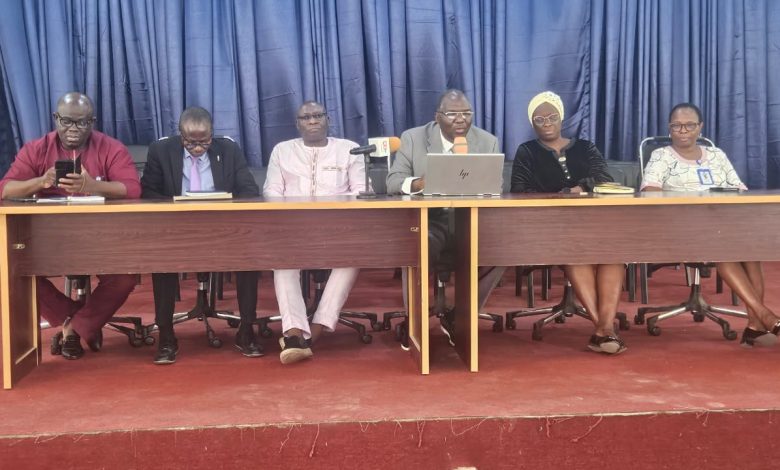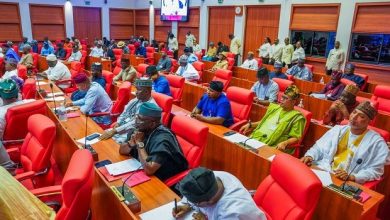
INTRODUCTION
In its usual giant stride, the Management of Olabisi Onabanjo University (OOU), commenced the 2025/2026 Academic Session on Monday, 6th October 2025, in line with its mandate of delivering quality education and producing graduates of sound character and competence for the Nigerian society and beyond.
Over the years, OOU has maintained enviable academic stability and institutional excellence, making it a foremost choice for admission seekers. In 2024, the University received over 21,000 JAMB applications, admitting slightly above 8,000 candidates. In 2025, the figure rose to 32,000 applicants, with our intake capacity still at about 8,000, underscoring our reputation for academic consistency and public confidence.
COUNCIL REVIEW AND DECISION ON TWO-DAYS OFF POLICY
At its 219th Meeting held on Tuesday, 27th September 2025, the Governing Council reviewed University operations presented by the management for the preceding year. One key issue deliberated upon was the two-days off-duty arrangement for non-academic staff, which, though well-intentioned, has obviously adversely affected productivity and workflow across several units.
Council observed that OOU’s operations depend heavily on continuous academic, administrative, and technical services. The two-days off policy disrupted service delivery, delayed essential processes, and undermined institutional efficiency. This is contrary to the original Government circular which stipulated that services must not be compromised.
It was further noted that the special transport allowance initially introduced to cushion the effect of fuel subsidy removal already addressed the hardship that led to the off-duty policy. Therefore, the continuation of the two-days off no longer had any justifiable basis.
COMPARATIVE POSITION OF OTHER INSTITUTIONS
Council also reviewed developments in other institutions within Ogun State. The Tai Solarin University of Education (now Federal University of Education) discontinued the two-days off since January 2025, while primary and secondary school teachers under the same Ogun State Government never adopted it due to the nature of their duties. Some other tertiary institutions that implemented similar measures have since stopped or reduced in few special cases to one day per week, when they provide funds to cushion the effect of transportation.
COUNCIL’S FINAL RESOLUTION
In view of the above, and in line with the University’s mandate of maintaining academic excellence and operational efficiency, Council approved the immediate discontinuation of the two-days off-duty policy. Council appealed for the understanding and cooperation of all staff, emphasizing that the decision was taken in the collective interest of the University community, to sustain productivity, discipline, and institutional reputation.
ENGAGEMENT WITH THE UNIONS
Demonstrating its democratic spirit, Management invited all four unions – ASUU, SSANU, NASU, and NAAT to a meeting to discuss Council’s decision. While ASUU and NAAT attended, SSANU and NASU declined on the excuse of a prior engagement. Regrettably, this marked the third time both unions had shunned Management’s invitation
It is pertinent to note that not all non-teaching staff share the stance of SSANU and NASU. ASUU and NAAT members never observed the two-days off, thereby ensuring the University’s academic stability. Had all staff done otherwise, the institution’s progress would have been jeopardized.
ESCALATION TO COUNCIL LABOUR COMMITTEE
Following Management’s report, SSANU and NASU jointly petitioned the Pro-Chancellor and Council, demanding a reversal. The matter was referred to the Council Labour Committee.
Although both unions initially refused to appear before the Committee, they later attended. The Committee appealed for cooperation, but the unions remained adamant.
It is worth emphasizing that all senior staff – academic and non-academic receive salaries on the same consolidated salary structure, which already ranks higher than that of federal universities. The insistence on two-days off therefore lacks any economic justification.
WELFARE AND BENEFITS OF NON-TEACHING STAFF
The non-teaching staff of OOU already enjoy superior conditions of service compared to civil servants in the state. For example:
- Ogun State civil servants have 30 working days of annual leave.
- OOU grants 30 days to junior staff, 42 days to senior non-teaching staff, and academic staff enjoy 30 days of annual leave plus 26 days of research leave.
Despite these privileges and the special allowances in place, SSANU and NASU’s demand to work for only 14 days per month is unrealistic and detrimental to institutional integrity.
POSITION OF THE OGUN STATE GOVERNMENT
Despite Council’s appeals, SSANU and NASU escalated their protest to the Ogun State Ministry of Education, Science, and Technology. In its response dated 27th October 2025, the Ministry reaffirmed Council’s authority, stating that:
“While noting the government’s general directive on the matter, it is important to emphasize that the Governing Councils of each institution are duly empowered to take appropriate decisions in light of their peculiar circumstances, operational realities, and institutional sustainability imperatives.”
This directive was communicated to the unions, yet they continue to misrepresent the decision as Management’s unilateral action.
STATUS OF PENSION CONTRIBUTIONS
For clarity, the Contributory Pension Scheme introduced nationally in 2004 was adopted by the Ogun State Government in 2008. Since then, OOU has continued to make deductions for staff who registered with PFAs.
Since assuming office in October 2022, the current Vice-Chancellor has ensured that both employee and employer contributions are remitted promptly alongside salaries. Outstanding arrears are being cleared progressively in line with the agreement with the unions.
A University-wide interactive meeting was held with PFAs to clarify pension issues. It was agreed that all staff due for retirement within five years will have their accrued deductions fully transferred to their PFAs, along with the approved schedule of ongoing payments.
REVIEW OF THE CONDITION OF SERVICE
The Condition of Service Review Committee, comprising representatives of all four unions, was reconstituted in 2022 to update the decade-old document. After extensive work lasting twelve months, the revised document will be submitted for Council approval at its next meeting in December 2025, following review by A&PC and PAT.
Notably, the promotion of all non-academic staff has been concluded, and beneficiaries are already enjoying their new emoluments. The academic staff promotions are ongoing and will soon be finalized.
CONCLUSION
The Governing Council and University Management remain committed to ensuring fairness, transparency, and efficiency in the administration of Olabisi Onabanjo University.
The discontinuation of the two-days off policy, regularization of pension remittances, review of the condition of service, and continuous engagement with unions are all geared toward sustaining academic stability, staff welfare, and institutional excellence – values for which OOU has become a model among state-owned universities in Nigeria








